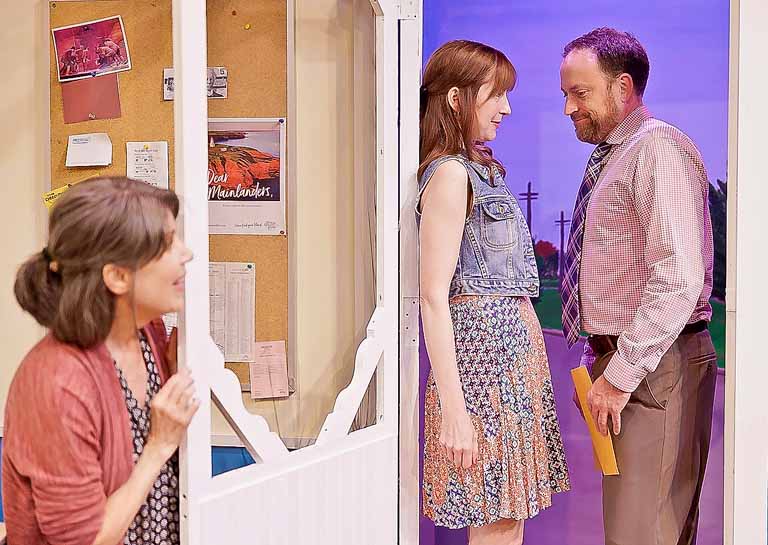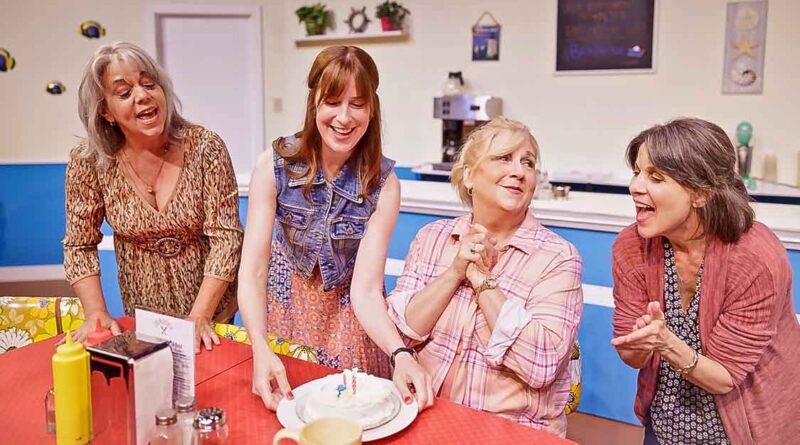Nothing Halfway About This Play
By John Swartz
The Opera House summer theater season continues with Norm Foster’s Halfway There. First, it’s standard to expect a Foster play to be a comedy. Expect his work is going to be funny, mostly. When a moment in any of his plays is not, it’s intentional. The only way they could be generally not funny is if the acting misses, or there is something else wrong with the production.
What is not apparent, until you start to analyze why it’s funny, is the human condition Foster is exposing. In every play of his I’ve seen I walk away thinking about the underlying existence of the characters and how they (and usually we) cope with issues. It’s often with humour, and unfortunately for the emotionally stunted irrationally acting out.
His characters, in this case Rita (Debbie Collins), Mary Ellen (Melodee Finlay), Vi (Vivianna Zarillo), Janine (Alison MacKay) and Sean (Reid Janisse), are not super idealized with exaggerated traits optimized for comedic effect. I guess you could say they are stereotypes, but Foster doesn’t beat you over the head with it. Instead his characters have character separate from the stereotype.
Rita is on the prowl and she’s not keeping it a secret. Mary Ellen is neglected at home. Vi thinks she doesn’t want to commit more than she has in her committed relationship. Janine is comfortable, but inwardly not satisfied with her life. Sean is out of his element, in this case geographically and romantically (he’s very recently not engaged).
The women are friends, very good friends and have been for years. I can think of a few groups of women I know of; when you see one, you see the others. They do a lot together. This play is the flip side of examining friendship among men as opposed to women, which is risky when you are a male author. There’s plenty to get wrong.
But when you see these women together you will think of real life cases you’ve encountered and think – I know these people. The hitch is, each of them have other parts of their lives which are changing and threaten the dynamic of the group, and in the end will break it up (on good, but tearful terms).
What happens to one is a matter for all to deal with, sorting out the issue and supporting each other. The big difference you understand by seeing the play is with men’s friend groups, they’ll go on and on figuring out why an engine won’t work and rib each other for stupid suggestions and rag on each other for quirky behaviour, but in the end they want to help a buddy fix something. These women do the same, kind of, but there’s a limit; they’ll let the individual make their own choice and be content with it (which doesn’t mean they won’t try every trick to influence a decision). For a writer, both cases have opportunity to write a joke.

Sean, on the other hand, does not have buddies in this story. He’s very far from home and temporarily staying in a little town in Nova Scotia. This town is equidistant from the Equator and the North Pole – and that’s its only claim to fame. It’s like living in a one- industry town; all of life revolves around one thing and not much else, so friendships are important because there’s nothing else to occupy one’s self with.
Sean is not the life of any party. He’s socially awkward, having been in a long-term relationship and finding himself cut loose. He is testing his confidence to do something different and be the version of himself that only lives in his imagination (and he can’t dance, at least with witnesses present). But, he is on the road. Being on the road is freeing. Nobody knows you, they don’t know your history and they don’t know the baggage you’ve been carrying. You can reinvent yourself if you choose to. You can try something different, take a chance. If you stumble or make a fool of yourself, who cares, you aren’t going to see any of those people again.
Of course none of that matters if you start falling in love. That’s a winner take all game and losing is not an option. You might act out of your usual patterns, but there is no room for error. Sean is falling for Janine. Janine is not falling for anyone, even the guy she is living with.
Here lies the battle of wits. Janine has a bench to rely on. Sean obviously doesn’t.
The enjoyment of the play exists on two levels. Some can take it in on the surface, laughing at the clever lines and situations without considering the depth and feel they got their money’s worth. For others, the deeper meaning will stay with you for a while and you’ll appreciate Foster’s subtlety weaving insight into the story.
Halfway There runs to September 1 and you can get tickets online.
(Images Supplied) Main: Debbie Collins, Alison MacKay, Mary Ellen, and Vivianna Zarillo in the Opera House’s Halfway There.



